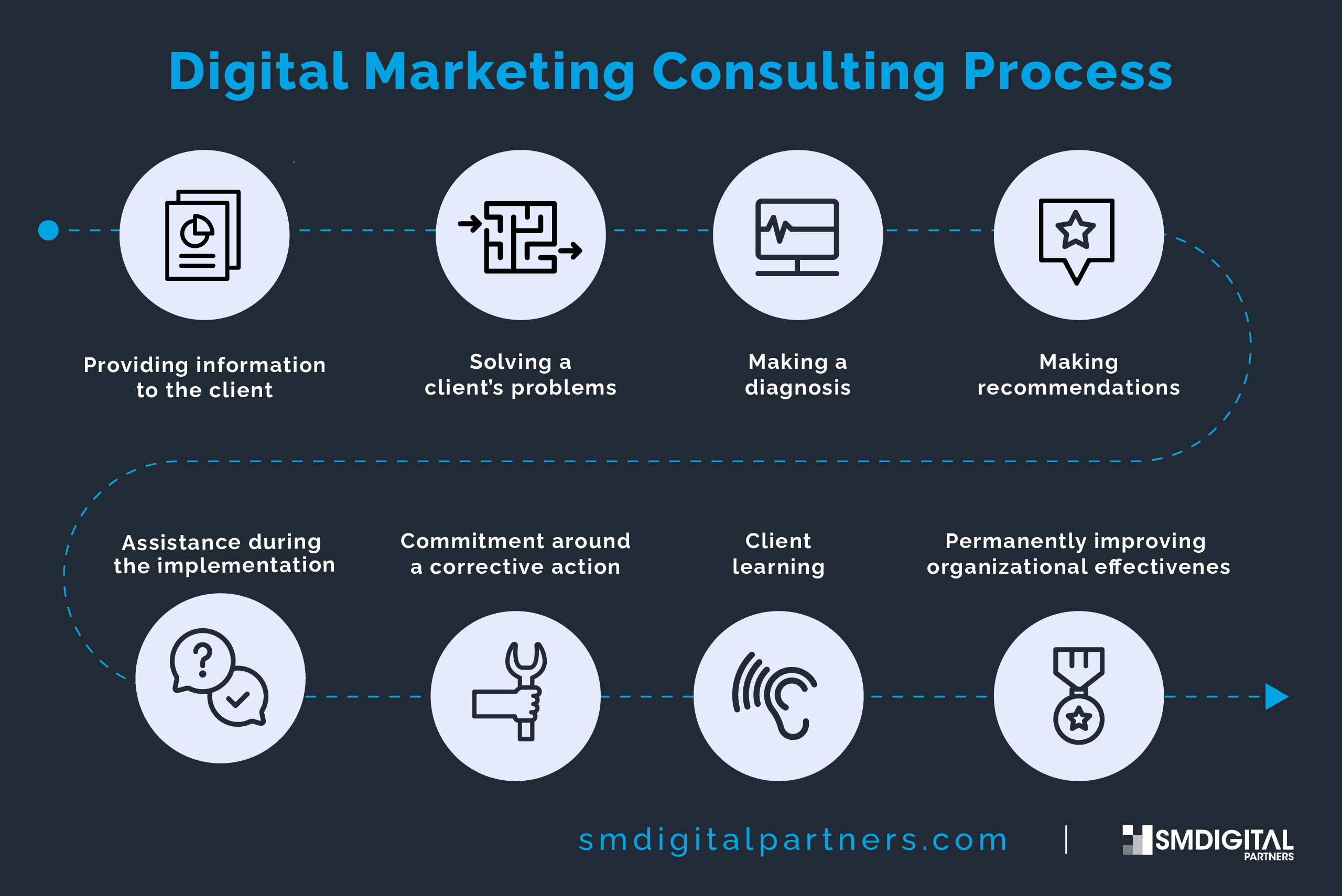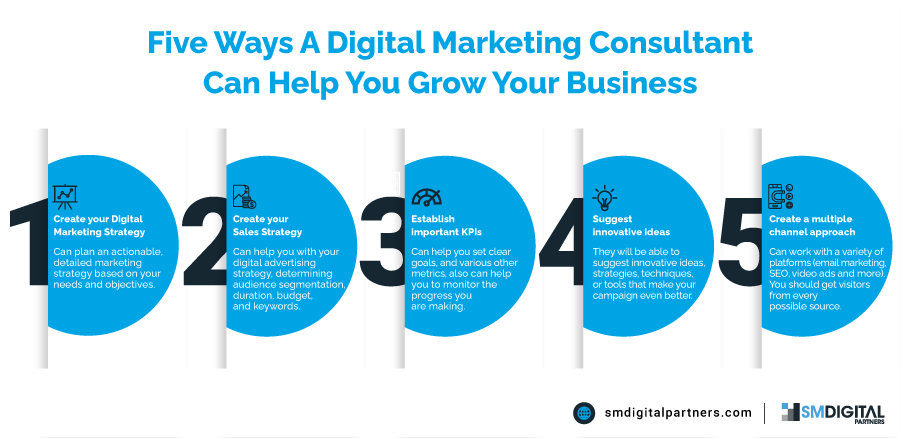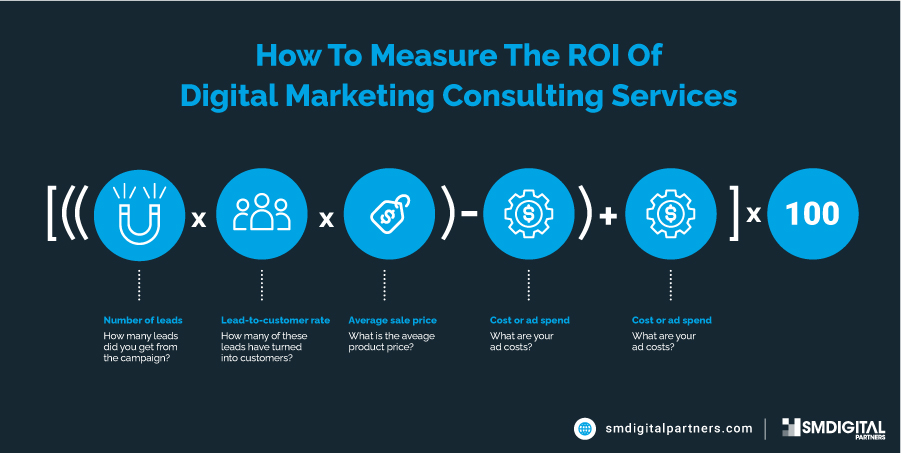
5 Web Development Consulting Tips for 2022
5 Web Development Consulting Tips for 2022 The latest web design and development trends in 2022
Consulting is a science and an art. An effective consulting methodology will start with data and customer insights and an assessment of a company’s existing resources and assets. With a specified data set as the performance beacon for results, a Digital Marketing Consultant will work with you to set new objectives and use innovation and creative solutions to reach those goals. A consultant will assess your current digital presence organically, isolate the gaps, recognize the risks and then create opportunities with you. During the process, the agency will work with your team to present your business to the digital world in a creative and measurable way that leverages your digital data to reach peak performance levels. Online and digitally!
Today’s business environment has crippled and closed businesses as a result of a pandemic that currently limits cultivating new relationships face-to-face. If a business did not have a digital plan to continue the relationship and engage customers, it missed the opportunity to thrive and probably won’t survive. The opportunity, if not necessity to create and scale your digital presence is the next step (necessary step) to business to thrive. We continue to help businesses expand their digital footprint, their revenue channels and their digital engagement with customers. Offering assessments, consultations and implementing solutions in the following areas:
Consulting includes a broad range of specialized activities. The practices defined as consulting are defined quite differently by both experts and their clients.

The most common way to define and categorize consulting services is by the professional’s area of expertise, such as corporate strategy consultancy, operations management consultancy, human resources consultancy, or digital marketing consulting. However, in practice, most of these professional areas coexist, while other categories may be defined using different terminology.
Another way to define consulting services is as a sequence of different phases – diagnosis, contracting, data collection, implementation, tracking, and feedback. This definition also has limitations, as these phases are discrete and highly specific to various types of consulting services. Also, some experts may prefer to employ different consulting stages altogether.
A widely accepted way to define consulting service is to consider its purposes. For instance, the expert should focus primarily on the goals of the consulting services, how the procedures can be implemented, and the engagement’s success. Consulting has eight fundamental objectives:
The first purposes are better understood and practiced but also more requested by most clients. However, professional digital marketing consultants try to focus on the higher numbers and provide more complex engagements to their clients.
The purposes numbered 1 through 5 are considered legitimate functions, although there is some controversy surrounding purpose 5. On the other hand, purposes labeled 6, 7, and 8 are less likely to be addressed by consultants and less likely to be requested by most clients. However, large consulting firms, which focus on multiple areas, tend to offer lower-numbered purposes in ways that include higher-numbered purposes. Smaller firms only provide higher-numbered purposes after the lower-numbered purposes have been achieved.
Generally, moving up the pyramid (going to higher purpose numbers) requires more experience, sophistication, and skill from consulting professionals. Unfortunately, some professionals try to shift the purpose of consulting service to higher numbers, even though this is not necessary. In this case, the consulting firm may lose track of the line between what’s best for their client and for the consulting firm’s activity. To avoid this common pitfall, consulting professionals should primarily focus on addressing the purpose the client requests. Shifting to other purposes should only occur if both parties agree to it.
Let’s go over the purposes and learn more about what they are about:
Most clients initially contact a digital marketing consultant to obtain information. Common sources of information provided by consultants include market surveys, analyses of competitors, attitude surveys, cost surveys or feasibility studies. Clients usually contact consultants in order to gain access to more accurate, updated information. Similarly, some clients prefer to work with third-party consulting companies because they cannot spare internal resources to develop this data independently.
In many cases, clients just want accurate, updated information from a consulting professional. However, the information a client needs is often different from what the client asks. For instance, a CEO asks whether each vice-president in a large company needs a private secretary. The CEOs question is rejected by consultants because the information is irrelevant, as the CEO already knows the answer. In this case, conducting an extensive human resources study is not required, even though the CEO specifically asked for one.
In the same example, the consulting specialist asked the following question “What will you do with the information once you have it?” Unfortunately, many clients never even think about the answer to this question. Often, clients just want further confirmation on various topics. In many cases, the information required by the client cannot be provided, even after an extensive study. In an ideal scenario, clients should work together with the consultant in order to determine what information is needed and why.
Some questions may seem impertinent, but they are highly productive, particularly in complex studies, and they should be cause for offense. What’s more, digital marketing consulting professionals have a responsibility to explore the underlying needs of their clients.
Some clients, particularly top managers in large corporations, give digital consultants difficult problems to solve. For instance, some clients may ask consultants whether they should make certain acquisitions, such as machinery, or whether they should change a marketing strategy. Managers may also ask about restructuring the entire organization, adopting new financial policies, or finding new solutions to problems related to control, management succession, internal communication, efficiency, or morale.
Dealing with these types of problems is normal in a large corporation, but consultants don’t have the skill to offer solutions to them. Also, they have the professional responsibility to ask whether these problems are really the priority in the company. Usually, clients will need help in defining the real issue within their company – and some consultants focus precisely on providing this type of service. In these cases, the consultant’s primary role is to explore the problem and whether it should be solved. Here are some common questions the consultant may ask during this step:
A good consultant should not accept or reject a client’s initial description without careful consideration. For instance, a client may present the issue as being related to low morale or poor performance in the hourly workforce. A consultant should not consider this issue as truthful immediately – a good consultant should try to uncover other potential causes. On the other hand, rejecting a client’s description too quickly may end a potentially useful project before it even begins.
Ideally, the consultant should accept the client’s initial description but also explore other closely related factors. In some cases, sensitive subjects may be difficult to discuss with clients, but they may hide the underlying problem in the organization. Both parties should work as close as possible to determine the actual issues that negatively affect the organization. A simple question like “why do we have poor performance?” may develop into “why do we have poor management and performance issues in this specific team?”.
In this scenario, the consultant determined the specific problem after a careful screening process and open communication with the client. Because of this fruitful communication, more precise definitions emerge naturally during the process. Remember that most clients are ambivalent about their need for help with the most important problems, and a good consultant should be able to respond to the client’s basic needs. It’s important to state that a solution to the wrong problem or a solution that cannot be properly implemented will not be helpful.
A big part of a consultant’s value lies in their experience as diagnosticians. However, the diagnosis process itself may create a strenuous consultant-client relationship. Many managers are often fearful of uncovering major issues in their organizations, specific issues for which they might be blamed. An extensive diagnosis process involves a complex set of procedures and requires more than the examination of external factors. The behavior of various employees may be included in the study, as well as the technology and economic tools used within the company. Also, the consultant may ask why executives make certain choices and how mistakes are handled by them.
Managers usually choose outside help (the consultant) because they want an unbiased opinion about the organization. This is very important during the diagnosis process, but good consultants often insist on drawing members of the client’s organization into the diagnosis process. According to an expert consultant, “we usually insist that client team members must be assigned to the project; they usually do the detail work; we only help during the process.” Typically, consultants focus on planning the diagnosis process and oversee the whole process. By doing this, consultants can also see how employees handle important issues, where are the bottlenecks in the workflow, and how skilled the employees are. Thus, consultants can also provide strategic or organizational recommendations to managers.
If clients participate in the diagnosis process, they are more likely to understand their role in the issues within the company. Also, they are able to better understand the consultant’s task. Major corporations understand this relationship and often create consultant-client task forces to better handle the issues within the company and assist during the diagnosis process. During the process, managers are able to implement corrective measures without having to wait for formal recommendations.
The initial client-consultant relationship concludes with a written report or an oral presentation that summarizes what the consultant has learned about the company. The report also includes recommendations that the client should make. Most consultancy firms work extensively on their reports in order to make them easy to understand and to include relevant information. Many clients consider that the role of the consultant is to provide a consistent, detailed, and logical action plan designed to address and solve a specific set of problems. Ideally, the consultant recommends a certain set of actions, and the client decides whether they should be implemented.
Although the process seems simple and quite straightforward, it may be unsatisfactory in many cases. Multiple in-depth, detailed reports, often created by experienced consultants, have no real impact because the client refuses to implement the recommendations. The reasons are multiple and can be related to costs, the time required for implementation, or lack of communication between the consultant and the client.
For instance, a large public utility company active in a developing country struggled for years to improve internal efficiency through tighter financial control. The company hired an experienced consultant from a local university to conduct an extensive study. The consultant submitted a full report, including more than 100 pages of recommendations. They included issues like civil service regulations, tax issues, employment and human resources issues, and relationships with local and central governments. Other reports were also submitted by other experts, but the client did not take any action for years. Unfortunately, there are many cases like this. Each side blames the other. Common reasons are “the client lacks the resources, ability, and courage to take the necessary action” or “the consultant did not specifically state what steps we should take”.
Many clients continue to complain about impractical recommendations. On the other hand, consultants blame clients for their lack of courage and lack of resources to actually take action. Unfortunately, many clients tend to either ignore the report or contact another consultant, further increasing costs. The solution to these problems is simple – the recommendations should be more direct, and clients should take action and implement them.
The precise role of a digital consultant during the implementation process is often debated in the industry. Some professionals argue that the consultant should simply create the report and provide recommendations, while the implementation should be handled by the client. Other professionals consider this attitude as unprofessional, as clients should not handle implementation only by themselves. Some consultants focus on providing help during the implementation process, based on the idea that recommendations that are not implemented are just a waste of resources. Similarly, just as the client is involved during the diagnosis process, without diminishing the value of the report, there are many ways to include the consultant during the implementation process. A consultant should offer assistance during the implementation process, but without usurping the manager’s job.
A good consultant will often ask for a second contract to implement the new recommended system. However, some clients may reject this proposal, especially if the collaboration was not fruitful up until that point. Also, some clients may be hesitant about the sudden shift in the nature of the relationship. The implementation work often requires more trust between the client and the consultant, which can only be built gradually throughout the engagement.
When the engagement is successful, the consultant will try to determine which action should be prioritized and how it should be implemented. Also, the consultant must understand that some managers prefer to do things differently, which may change the outcome of the implementation process. Recommendations should be continuously adapted in order to ensure proper implementation. Some consultants have a common problem during the implementation process – they don’t know whether they should recommend something that is right or something that will be accepted. Unfortunately, some actions will not be implemented because of this, even though they were recommended in the report and may have improved the organization and its internal procedures.
In essence, implementation is the central concern of the consultant-client relationship. When clients ask for information, they want to use the information in a specific context and implement the results in order to increase efficiency in the company. Similarly, the consultant asks the client how the information will be used and what steps were done in order to acquire it. After this interaction, the consultant, together with the client, will determine what the next steps are and how they should launch further actions. A good consultant continually offers support to clients during the implementation phase by asking questions, offering solutions, or recommending tools. Monitoring progress is also provided and is an important part of implementation support.
Ideally, managers should be open to suggestions and recommendations during the implementation phase – they should not wait until the end of the project to take action and implement changes. Some innovations may prove useful immediately, and they should be applied to the whole organization as soon as possible. Waiting until the end of the project may be detrimental for the client. Managers must be ready and commited to change, but also to learn new ways of solving problems in order to improve company performance. These goals can be achieved if both parties understand and manage the process of the entire engagement.
Most people are more likely to use innovations that are already successful than recommendations that are just set forth on paper. Recommendations that were implemented during the project have been proven as more successful than those implemented after the project’s completion. Effective implementation requires commitment, consensus, and good problem-solving techniques.
An engagement is useful to a client if all the members understand the nature of their problems, opportunities, and what types of corrective actions are required. Otherwise, the diagnosis is irrelevant, the recommendations won’t be properly implemented, and information may be impossible to use. Also, consultants must be persuasive and have the experience to provide sound and convincing recommendations. However, the most important skill is to design and conduct the entire process. This is important if you want to build an agreement between parties and establish the momentum to see these steps through.
According to a consultant: “Effective digital marketing consulting means convincing a client to take action; however, this is only the tip of the iceberg; also, it’s important to establish agreement within the organization that this action makes sense – the client must move forward and take action, but there should be enough support inside the company to make the whole process successful. A good consultant needs excellent problem-solving techniques and the ability to convince the client through the logic of the analysis. Similarly, enough key players must be involved in the process so that it will succeed. The consultant must develop a strategy to determine who is important for the project and how to attract these key players.”
Consultants can determine a client’s readiness and commitment to innovations and change by considering these questions:
Clients should not expect that their consultants will ask these questions. However, they should expect that the consultants are concerned with similar issues during the important phases of the engagement.
Consultants should increase commitment through client involvement, preferably during each phase. In addition, the digital consultant should kindle enthusiasm with an ally from the organization. The ally can be a lower-level employee, but he or she must understand the goal of the changes and how they can affect the company in the long run. This type of sponsor may prove invaluable to the project, offering important insight into the company’s functioning and major issues that have to be solved. The ally’s role is similar to an informant-collaborator in science and is often successful, particularly if not explicitly sought after. In other words, this ally should be a volunteer in the process.
If done skillfully, interviews can gather adequate information, build trust, acceptance and can make clients understand the need for change throughout the organization. The consultant’s approach should show that the reason for the interview is not to show what’s wrong within the company. Managers should be open to this interview and see it as a beneficial aspect of the project. In this case, all members of the organization will see the project as helpful, not as an unwanted inquisition.
By gauging the resistance or acceptance, the interviews help consultants learn what type of corrective actions should be taken and how. Also, these interviews may reveal sound solutions and more willingness from clients to confront difficult situations. Similarly, consultants can get more information from potential resisters, their data, their viewpoints, and how to deal with them. Experienced consultants learn to appreciate resisters as they indicate what is unobtainable and how to deal with people who are opposed to the project.
The consultant-client relationship is critical in developing commitment and consensus. A relationship should become a collective effort and search for acceptable answers to the client’s real concerns. Each meeting should work as a two-way reporting session on what was done, what needs to be done, and schedule further steps. During these meetings, a process of mutual influence should develop, with natural shifts in focus and agenda, as the project evolves in time.
Effective management consulting is difficult if the relationship lingers. The consultant-client relationship should be a collaborative effort in the same direction. Good digital consulting services are expensive not only because the fees are high but because senior managers should be involved in the process.
Good management consultants like to leave something behind after the project is completed. This means teaching clients how to deal with immediate issues. However, clients should also be taught how to cope with future challenges. Remember that this does not mean that consultants will work themselves out of a future job. Good consultants will have happy clients who will recommend them to other clients but also invite them back for another project.
Consultants bring more value by demonstrating a technique or recommending a good book on the topic, as opposed to quietly performing a needed analysis. Similarly, if the problem is complex, a good consultant may recommend another consultant who has experience in the specific field. Also, some consultants prefer to recommend educational programs for their clients. Some employees may attend these courses and learn how to deal with issues as they arise.
Client education can only occur if the client is involved in the entire process. If this is the case, there will be many educational opportunities during the project and after it. Usually, consultants may suggest courses, task force assignments, work-planning methods, and goal-setting processes. Although the educational process is a good idea in many situations, some managers may be resistant to it. Managers may not like the idea of being taught how to manage the company. Client learning is important, but overdoing it may come across as presumptuous.
Keep in mind that learning is a two-way street. In every project, consultants should learn how to be more effective in planning and implementing projects. Some professionals and clients may be very open to learning, while others may be resistant. Ideally, both parties should learn from each other equally.
Successful implementation of a project is not just about new management concepts and techniques. It’s also about different attitudes regarding prerogatives, management function, or even changes in how the company is defined or how it works. Organizational effectiveness is an umbrella term that refers primarily to a company’s ability to adapt future strategy and behavior to environmental change.
Top consultants who include this step in their practice contribute to the company’s most important task – maintaining the company’s future viability in an ever-changing environment. Although this may seem like a vast goal for many projects, good consultants should at least focus on how to tackle this aspect. The activity should be similar to how a physician works. A physician may improve the functioning of one organ but also contributes to your overall health.
Most projects produce a change in one area, but that improvement may not be very productive if it doesn’t work together with other aspects of the system. For instance, if employees in a specific department get new tasks, friction may result in another department. Similarly, a poorly planned marketing strategy may cause disruptions in sales, manufacturing, and sourcing, causing friction in these departments. The impact of these measures is difficult to estimate, and their repercussions can be dramatic. This is why it’s very important to implement recommendations across the whole company.
A good consultant should promote overall effectiveness during each step. For instance, a digital consultant should pay attention to one department but take into consideration what’s happening in every department within the company. Also, the consultant should think about future needs and potential issues. Managers may be open to suggestions explanations, but consultants should look for alternatives in order to increase effectiveness within the company. Clients should also understand that consultants are not asking questions just to get more work; they are asking questions to develop a better strategy and find better solutions.
Important changes in a company rarely happen just because a consultant recommends it. Sure, consultants have influence during the project, but clients must be open to suggestions. For instance, if consultants believe that communication should be better in an organization, they can suggest project task forces of employees from different departments. However, if the manager discovers that the secret weapon in solving the communication problem is simply asking the people for suggestions, he or she will understand the importance of better upward communication. The best digital marketing consultants work by encouraging clients to improve company effectiveness, not by writing complex reports or recommending books on the subject.
A good consultant can plan an actionable, detailed marketing strategy based on your needs and objectives.

Americans are on their phones most of the day. In fact, recent data shows that 66 percent of Americans check their phones 160 times a day.
We are glued to our phones every day, but we are also glued to our PCs, laptops, we play video games, watch Netflix, and so on. We are glued, in fact, to the digital environment. Virtually almost every activity we enjoy has a digital presence. This means that companies need to have a digital presence to be relevant. We are online, so it’s perfectly normal for businesses to be online.
The digital world is problematic, though – it’s constantly evolving and changing. New digital marketing trends pop up almost daily – how are you supposed to keep up? Who can guarantee that your digital marketing campaign is relevant to the current digital requirements? People are coming up with new, improved digital marketing tactics, so how can you make sure you use the latest ones?
Don’t worry – this is where a digital marketing consultant can help you:
Digital marketing consultants create a complete digital marketing strategy for your company, depending on its objectives. Planning is critically important in digital marketing. A recent report suggests that planned campaigns are 356 percent more likely to succeed than unplanned ones.
A good consultant can plan an actionable, detailed marketing strategy based on your needs and objectives. This is done by conducting an in-depth analysis of your company’s current position and audience.
The consultant will start with a SWOT (strength-weakness-opportunity-threat) analysis based on your current company’s situation. This analysis will provide excellent insight into your company and how it can achieve its goals. Also, you will gather important information about the market and competitors.
Another type of research done by the consultant is audience research. This will result in creating buyer personas – this will help you determine who the people that will buy your product or services are. Similarly, the consultant will easily figure out how to reach that audience, which is their preferred marketing channel and how to create a good strategy to reach the potential clients.
Finally, the consultant will create the best overarching strategies based on this research. You will receive a precise list of tasks that will help you boost your business.
Your digital marketing consultant can also help you with your digital advertising strategy. For instance, the consultant can plan your paid ads strategy, which leads to more traffic to your website and more sales. If your advertising strategy is good, for every $1 spent on ads, you get $2 in revenue.
Keep in mind that Google is not the only option for advertising. Your consultant can choose another digital advertising platform to get more visitors and sales depending on your business or target audience. Similarly, you can choose from various advertising methods, such as native advertising, video ads, paid social media ads, or other digital placements.
The digital marketing consultant will also determine other important aspects of your advertising strategy, like audience segmentation, duration, budget, and keywords. Your consultant will plan and implement your advertising strategy from start to finish.
You should have an idea of your marketing goals before starting the actual campaign. If you don’t have a clear set of objectives, you won’t be able to monitor the progress you are making.
A good digital marketing consultant can help you set clear goals, known in the industry as key performance indicators (KPIs) and various other metrics. These will help you create a transparent system by which you can measure the performance of your digital marketing campaign. You’ll also get a clear idea of what tools or software to use to increase the campaign’s effectiveness.
A digital marketing consultant will bring a fresh, unbiased perspective on your strategy. They will be able to suggest innovative ideas, strategies, techniques, or tools that make your campaign even better.
They are the experts and are always up-to-date with the latest trends in the industry. They can come up with new, innovative ideas that will grow your business quicker. Here are some of the latest digital marketing trends that a good consultant should be familiar with:
Contact a digital marketing consultant to include these cutting-edge strategies in your marketing campaign.
You will need an omnichannel marketing approach these days. The reason is simple – most people come into contact with your company or brand in a variety of digital environments before making a purchase. You have to reach these potential clients and attract them to your website. What’s more, you can reach more people if you focus your efforts on different channels.
Good digital marketing consultants are familiar with the omnichannel approach and can work with a variety of platforms, from email marketing to SEO and from social media to video ads. Ideally, your campaign should be active on multiple channels, and you should get visitors from every possible source. You must get in front of your target audience, and focusing on multiple channels is the way to go.
Here are a few tips to help you get the most value from working with a digital marketing consultant:
Any professional digital marketing consultant will do their best to make you happy and create an effective marketing campaign. However, that can only happen if you set clear objectives and expectations.
Your professional relationship with the consultant will start with an initial consultation. Then, you will have regular sessions in order to plan and implement the strategy, depending on your objectives and the workload. Be open about your objectives, expectations, and preferences. Discuss what you want to achieve and how many sessions you need. During these sessions, the consultant will plan your strategy and track results.
For instance, let’s say that by session #6, you hope to have an increase in traffic by 20 percent. Your consultant can precisely estimate how much this increase will be, depending on the techniques and tools you are using.
Try to be as open as possible about your expectations. Talk about which tasks are more important to you, which you want to prioritize over others, your preferred method of communication, and how often you want to receive updates.
The digital marketing consultant will need free access will to your digital assets and accounts. This is why it’s very important to work with a reputable digital marketing consultant who you can trust.
You will have to provide access to your social media accounts and Google Analytics (to view reports and analytics on current traffic), and other accounts. Furthermore, you will have to allow access to relevant documentation related to your business. This includes data about your current target audience, branding guidelines, marketing plans, market analysis, and your mission statement. These things are important to share because your digital marketing campaign is based on the data you provide. Your consultant should learn as much as possible about your business and its plans for the future.

5 Web Development Consulting Tips for 2022 The latest web design and development trends in 2022

Why You Need Google Advertising Consulting in 2022 Google advertising doesn’t have to be complicated. Learn

Here’s What SEO Consulting Can Do for Your Business Knowing the rules and regulations regarding SEO

5 Reasons You Need Social Media Marketing Consulting A social media marketing consultant is specifically trained
Keep in mind that there are multiple variables to consider when calculating ROI

ROI – the return of investment refers to the profit you gain from your investment. Here’s a simple, common formula to calculate the ROI:
Keep in mind that there are multiple variables to consider when calculating ROI. For instance, your campaign may generate many good leads, but a poor sales team may fail to turn them into actual customers. Of course, this will impact the ROI. Other variables that may be taken into consideration are more general, such as the state of the economy or the seasonality of your company’s activity (such as tourism).
There’s another thing to understand – what you may gain from a marketing strategy depends heavily on your objectives. Always focus on what you gained in relation to your goals, not purely on monetary values. Also, try to measure the ROI in relation to KPIs. Is your company more visible? Did you succeed in creating brand awareness? Are your rankings better? Did you see improvements in the click-through rates of your emails?
Just remember that ROI doesn’t necessarily translate into dollar amounts. For instance, you can have huge gains in brand awareness but minimal immediate financial results. These vast gains will most likely be visible in massive sales much later, long after your current marketing campaign is completed.
Hiring a good consultant for your company is an excellent investment. However, it’s vital to choose the right one. Here are a few tips to help you make a perfect choice:
Always choose a digital marketing consultant that has the right experience and matches your specific needs. For instance, if you want to focus on content marketing, choose a professional that has experience in this field. Also, focus on finding a professional that has experience in your industry or niche. Find out who their previous clients were and what type of results they achieved. Similarly, check the size of the company you will be working with. If your company is large, look for a consultant that can manage the workload properly.
Does this consultant get results? Can the consultant deliver on your specific KPIs and help you reach your goals and objectives? Do your research and find out more about the company you will be working with. Look for case studies when working with a consultancy company. Similarly, you can ask for relevant examples of other successful campaigns. Also, look at how they are marketing themselves and their services. A good consultancy company should have an excellent online presence. After all, it’s what they do.
Anybody can market themselves as… anybody. People and companies can claim whatever they dream of, but you should look for proof that a digital consultant is credible. Can other clients vouch for them? Try to find reviews, testimonials, and write-ups from other companies or third parties. Accreditations from major online companies are also good – look for any certifications from Google or HubSpot.
4 – Look for a knowledgeable consultant
A good digital marketing consultant should be able to educate you and prepare you for success. They should be able to answer your questions and provide solid advice when you need it. They should have an in-depth knowledge of digital marketing best practices current and future trends. Always work with a consultant that has plenty of hands-on experience.
Choose a professional who shares the same vision as yourself when it comes to growing a business. Try to understand their values and how they work. Get to know them on a personal level as well. Ask them the right questions, like:
Hiring a digital marketing consultant is an excellent idea if you want to grow your company, keep up with advancements in digital marketing, and better your competitors. A good consultant will bring fresh ideas, will help you dominate your industry, and bring tons of new visitors to your website. Just make sure you find the right consultant for your business – one that has adequate experience in your niche and a proven track record.


At SMDigital, it’s all about our people, our passion, and performance for our clients! See what we can do for you!
Monday – Friday 9:00AM – 6:00PM, EST
Saturday – Sunday: Closed
Santiago Tobon
stobon@smdigitalpartners.com
US Headquarters
Congress Commerce Center
601 N. Congress Avenue
Delray Beach, FL 33445
Julián Arroyave
jarroyave@smdigital.com.co
Carrera 42 #14 – 11 Piso 5
Edificio Castropol Plaza
Medellin, Colombia S.A.
Grace Bautista
talent@smdigitalusa.com
Jose Maria del Mar St.,
cor. Abad St., Cebu IT Park,
Cebu City 6000, Philippines
Santiago Tobon
stobon@smdigitalpartners.com
US Headquarters
Congress Commerce Center
601 N. Congress Avenue
Delray Beach, FL 33445
Julián Arroyave
jarroyave@smdigital.com.co
Carrera 42 #14 – 11 Piso 5
Edificio Castropol Plaza
Medellin, Colombia S.A.
Grace Bautista
talent@smdigitalusa.com
Jose Maria del Mar St.,
cor. Abad St., Cebu IT Park,
Cebu City 6000, Philippines

At SMDigital, it’s all about our people, our passion, and performance for our clients! See what we can do for you!
Schedule a 30-minute discussion with one of our digital experts. We’ll listen to your challenges and tell you if we can help.